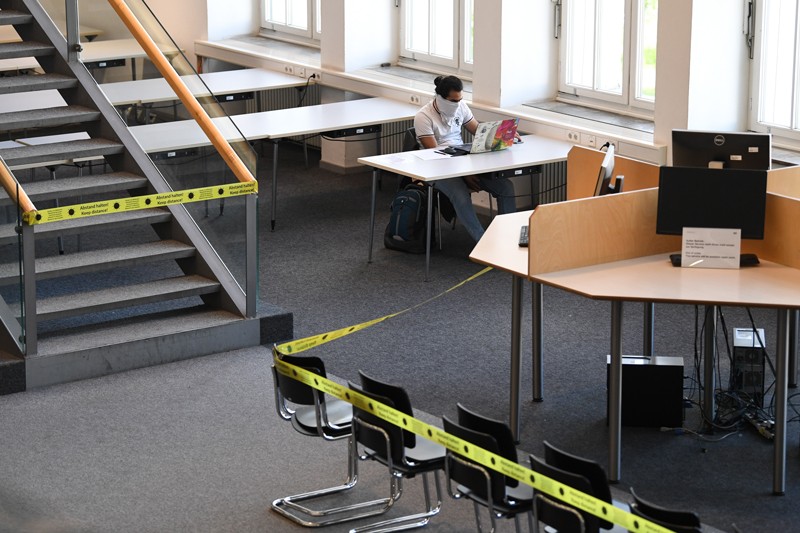Five ways to tackle PhD research anxieties triggered by COVID-19 lockdowns
Among researchers, PhD students are perhaps suffering the most from coronavirus lockdown restrictions put in place around the world. Interruptions caused by the pandemic are producing a cohort of worried research students who are concerned about the completion and quality of their work.
One student in our department at Edge Hill University in Ormskirk, UK, is working on the conservation ecology of a rare butterfly and needs to synchronize her fieldwork with the insect’s flight period. This lasts from late June until late July, so this year’s field season will almost certainly be lost. Another student, a microbiologist, started her PhD only a few months ago, and has no laboratory access and thus no means of generating data.
At the other end of the PhD timescale, a student investigating the molecular basis of insecticide resistance in mosquitoes is facing difficult decisions on the feasibility of a planned final round of experiments. Does she wait, and continue once insect stocks are raised and labs are functioning again, or does she curtail the work and proceed with writing up, knowing that important evidence might be missing?
It is unlikely that any of these students would have a problem getting extensions to their deadlines — but extensions to funding might not be so easily available.
As student and supervisor, we soon found ourselves facing the same dilemmas. When the lockdown seemed imminent, we discussed our plans — and potential alternatives — for the next few weeks. As the situation worsened and the prospect of long-term effects became a reality, our meetings came to cover growing anxieties over the future of the project. We talked about the restrictions imposed on our plans by the pandemic and what financial support or extra time the university plans to provide to postgraduate researchers. We then realized that, to move forwards, we had to welcome change.
Right now, there is a generation of PhD students stuck at home for whom the constraints and uncertainty created by the coronavirus present a unique obstacle. We think that doctoral projects — like many other ongoing projects — should be adapted to the circumstances by encouraging creative thinking and updating academic standards. Here are five ideas for students (and supervisors) in a similar situation to ours. We acknowledge that some will not be feasible, but we consider it important that PhD students think creatively and strategically about the options open to them.
Consider a different research route for the project
Less time available in the lab or in the field might mean a new approach is required to address the research question. Think about a fresh perspective or element for the project. For instance, after discussions with her supervisors, our butterfly researcher has transformed her original plans — to manipulate the insect’s habitat to assess the impact of vegetation changes — into a meta-analysis of the relevant literature.
Reassess the study’s priorities.
Update the plans for the research. Be ruthless. PhD students and their supervisors should identify analyses that they can do while working from home, important experiments to set up as soon as possible and experiments to omit if time is going to be more limited.
Consider reducing the number of chapters in the thesis.
The academic requirements for a PhD are to generate original findings and place them in the wider context of the literature. In many cases, this is possible in fewer chapters than initially planned. There might subsequently be one less paper, but university employers and funding bodies will recognize this new reality. The world of science should accept that it’s OK to do less during this unprecedented situation.
Seek inspiration from colleagues through social media.
Despite the cancellation of conferences and seminars, there are still opportunities to discuss your ideas or plans with colleagues. For instance, several societies and research communities are opening up online spaces for researchers — especially early-career scientists — to provide inspiration through social media. Use these platforms to get fresh ideas for the project, and to present some results and plans, and get feedback on them.
Be upfront about the challenges with the examiners.
When the time comes for the viva, be confident in explaining the effects of the pandemic on the project in the thesis’s introduction or in the PhD defence. The external examiners will have seen the impact on their own research and will be sympathetic to the challenges you have faced. A favourite question among examiners is how the project has evolved as it progressed. The current crisis gives students a head start in answering this.
Even without the disruption and uncertainty caused by the pandemic, a PhD is rarely smooth sailing. However, a smooth sea never made a skilled sailor. For PhD students, this global crisis is an opportunity to show resilience as researchers negotiating the choppy ocean of their projects. The rest of us should remember that PhD students rely on their supervisors and research community for direction and encouragement. The pandemic is likely to take a toll on their mental health over and above the usual pressure from deadlines and the demand for publications. In these strange times, research students need our support and understanding more than ever.
This is an article from the Nature Careers Community, a place for Nature readers to share their professional experiences and advice. Guest posts are encouraged.





